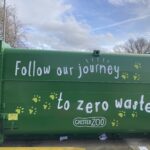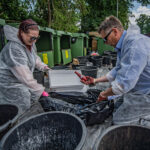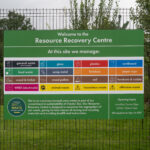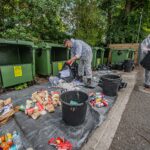To achieve our mission of preventing extinction, it’s essential that we address the global threat to biodiversity presented by climate change, waste and the overexploitation of natural resources. That’s why we’re taking action on sustainability at Chester Zoo.
We aim to be a leader in sustainable attractions, creating a framework for reducing the environmental impact of visitor attractions. We also aspire to work with partners to collaborate on solutions that enable the sector to develop more sustainable ways of operating.
As part of our Conservation Masterplan and Sustainability Policy we set four sustainability targets as an organisation, for our zoo site and wider estate to be:
- Carbon net zero in our scope 1 & 2 emissions by 2030
- Towards a zero waste operation by 2030
- Procurement of deforestation-free commodities in all major supply chains
- Achieve net gain for UK biodiversity, with at least 30% of zoo owned land being managed for UK biodiversity by 2030
Carbon net zero
Decarbonising our operations by avoiding or reducing emissions from our energy and fuel use.
ZERO WASTE
Towards zero waste across zoo operations by 2030 by reducing, reusing and recycling waste resources.
DEFORESTATION-FREE
Working towards buying products that don’t cause deforestation in our major supply chains.
UK BIODIVERSITY GAIN
Enhancing and protecting UK biodiversity on site and managing 30% of our land for biodiversity by 2030.
We’re transforming our operations to achieve our sustainability targets, including new solar PV and heat pump installations, more plant-based menu options, and new waste segregation facilities!
We’re also using our voice as a major conservation and education charity to influence positive changes for sustainability, influencing legislation, promoting sustainable tourism and encouraging sustainable behaviours in consumers and industry.
CARBON NET ZERO
We’re facing a global climate crisis, which is also contributing to the global biodiversity crisis.
We’re working to reduce our greenhouse gas emissions as an organisation to achieve carbon net zero in our scope 1 & 2 emissions by 2030. We aim to reach net zero Greenhouse Gas emissions from our Scope 3 emissions by 2050 at the latest, from a 2019 baseline.
We will focus on avoiding or reducing emissions to decarbonise wherever possible and minimise the need for offsetting, which will only be used to offset residual emissions.
We already have some measures in place including installations of solar photovoltaics (PV), heat pumps and electric vehicle charging points andwe’re scaling up our use of low carbon technologies to decarbonise our operations. This will include expanding our use of key interventions including:
- solar PV
- heat pump technology
- electric vehicles
- low carbon building materials and techniques
- tree planting and soil health
- working with our suppliers to reduce the carbon impact of the products we buy
ZERO WASTE OPERATION
Around the world, more and more waste is being generated and leading to significant environmental impacts and pollution.
At Chester Zoo, we’re taking action on the waste we generate and working towards zero waste across our zoo operations by 2030, through applying the principles of a circular economy to prevent, reduce, reuse and recycle.
To deliver this will involve:
- Minimising the waste we produce by using resources more efficiently and influencing the products we buy from suppliers
- Maximising resource recovery by reducing, reusing and recycling as much of our waste as possible
- Working to avoid the use of incineration and landfull as a means of waste disposal wherever possible
Where there are waste streams that must be disposed of in specialist ways, we’ll work to reduce our use of these materials and work with industry to influence alternatives.
We’re working closely with Reconomy brand ACM Environmental to work towards a zero waste operation by 2030.
To maximise the potential for reuse and recycling, ACM Environmental helped design a Resource Recovery Centre (RRC) to provide us with the hardware needed to maximise the segregation, reuse and recycling of waste and avoid the use of landfill and incineration where possible.
The RRC, along with a new Zero Waste Steering Group, supports a data-led, tech-enabled approach that helps us better understand our waste streams. Regular analysis of waste generated on site gives us insight into the sources and end point disposal of materials, helping to identify priorities for action. This approach is supported by the Steering Group, which brings together key stakeholders to guide the strategy towards our zero waste target.
“Chester Zoo is a brilliant example of an organisation that is authentically committed to achieving real change through its resource management strategy. With our support they are making substantial operational changes to do what is right for our precious environment. I am certain that we will continue to make strong progress towards Chester Zoo’s ambitious objectives and help deliver impactful change.”
Russ Sampson, Waste & Recycling Consultant at ACM Environmental
Deforestation-free commodities
Up to 80% of global forest loss and land conversion is attributable to the production of agricultural commodities and forestry products demanded by consumers. These products include:
- palm oil
- cocoa
- coffee
- soya
- timber, pulp and paper
- cattle (beef and leather)
As part of a wider approach to sustainable procurement, we’re working to address the products we use at the zoo that have the potential to contribute to deforestation and wider land use change (also known as ‘forest risk commodities’).
This will include:
- Working with others to influence legislation and adopt deforestation-free standards across industries
- Meeting legal requirements in our own supply chain
- Developing and adopting best practice sustainable procurement
Our work on deforestation-free commodities will build upon the success of our work on Sustainable Palm Oil. As part of this, we’ll be working to influence our suppliers and international policy to address the issue.
UK BIODIVERSITY GAIN
UK biodiversity is under threat and we must protect and enhance it to allow nature to survive and thrive.
We aim to avoid or minimise any negative impacts to biodiversity from our operations. Where impacts do occur, we follow the mitigation hierarchy and apply Biodiversity Net Gain principles, where appropriate, to ensure improvements for UK species and habitats are made overall on the zoo and its landholdings.
We’re also working to have 30% of our zoo and landholdings managed as dedicated UK biodiversity areas.
To deliver this will involve:
- Creating, restoring and managing habitats across the zoo for UK species
- Conducting assessments of our impacts on biodiversity and applying the principles of biodiversity net gain
- Managing our land to promote and protect biodiversity
- Working with others to promote best practice and to connect people to nature beyond our zoo and landholdings
Sustainable palm oil
We’re taking action to address the deforestation, loss of biodiversity and greenhouse gas emissions which result from the unsustainable production of palm oil.
Sustainability in food and beverage
The future depends on the sustainable work we do today and the Food & Beverage team are conscious that every little effort counts. Sustainability is a key driver for making decisions within Food & Beverage at Chester Zoo.
Our conservation masterplan
Our Conservation Masterplan aims to make a significant contribution to tackling the global extinction crisis by 2031.



